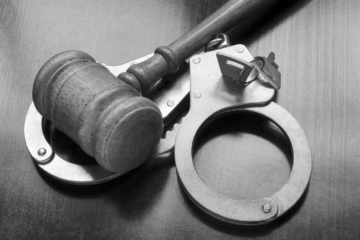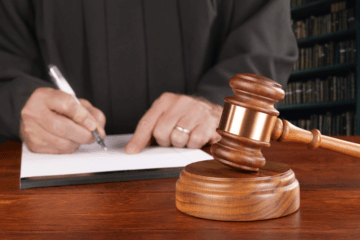
This article is written by Poornima of 1st Semester of University of Allahabad, an intern under Legal Vidhiya
Abstract
Laws for rights of prisoners are evolving yet today. It is a major drawback of a country like India that it doesn’t have any codified law for rights of prisoners and also there is no explained legislation to maintain and regulate the rights of prisoners and control and limits their conduct or behaviour in jail. But still judiciary of country always recognise and protect the fundamental rights of every person whether it is accused or victim through their various judments and decisions made during trials of cases. In the absence of thorough legislation, it has managed to set precedents and principles upholding the various rights of prisoners that not only guide but also bind all the courts in India. As we discussed earlier, the rights of the prisoners have been a developing one. In Platek v. Aderhold (USA) case in which the courts decided to have no power of interference with the conduct of prison or its rules and regulations then in case of Johnson v. Avery the court recognized some specific rights of the prisoners, the change has been a progressive one. In Indian context, the judiciary of the country has invoked Fundamental Rights of the Constitution repeatedly to the rescue of the prisoners.
In the famous case of Charles Sobraj through Marie Andre’s v. The Superintendent, Tihar Jail, the Supreme Court Judge Justice Krishna Aiyer held that,“imprisonment does not spell farewell to fundamental rights although, by a realistic re-appraisal, Courts will refuse to recognize the full panoply of Part III enjoyed by a free citizen”.
Introduction
A famous quote of Nelson Mandela, “It is said that no one truly knows a nation until one has been inside its jails. A nation should not be judged by how it treats its highest citizens, but its lowest ones.”
The words of Nelson Mandela are true. India is a democratic country and the Constitution of India gives fundamental rights to every citizen of country, which also extend to the prisoners or detainees.
In case of A.P. Challa Ramkrishna Reddy, AIR 2000 SC 2083, it was said, “a prisoner is entitled to all his fundamental rights unless his liberty has been constitutionally curtailed. The Supreme Court has emphasized that a prisoner, whether a convict, under trial , does not cease to be a human being and, while lodged in jail, he enjoys all his fundamental rights guaranteed by the Constitution of India including the right to life guaranteed by the Constitution”
In case of State of Maharashtra v. Prabhakar Pandurang Sanzgir, 1986, the Supreme Court stated that detaining someone cannot deprive his fundamental rights and that such conditions are not to be extended to the extent of the deprivation of fundamental rights of the detained individual.
The United Nations Standard Minimum Rules For The Treatment of Prisoners (Nelson Mandela Rules)
Now let’s have a look on international perspective of prisoners ‘rights. The UN Standard Minimum Rules for prisoners was adopted by the United Nations General Assembly on 17th December 2015. There are 122 Rules laid down in the Resolution. Some important ones are laid down below:
• All prisoners shall be treated with respect due to their inherent dignity and value as human beings.
• The rules shall be applied impartially, with no discrimination on grounds of race, colour, sex, language, place of birth, etc.
• Prison administration should offer education, vocational training and work, as well as other forms of assistance that are appropriate and available, including those of a remedial, moral, spiritual, social and health and sports-based nature.
• All prisoners with physical, mental or other disabilities have full and effective access to prison life on an equitable basis.
• Different categories of prisoners shall be kept in separate institutions or parts of institutions, taking account of their sex, age, criminal record, the legal reason for their detention and the necessities of their treatment.
• All accommodations provided for the use of prisoners and in particular all sleeping accommodations shall meet all requirements of health.
• The sanitary installations shall be adequate to enable every prisoner to comply with the needs of nature when necessary and in a clean and decent manner.
Rights Of Prisoners Under Constitution Of India
Article 20 – Protection In Respect Of Conviction For Offences
- No person shall be convicted of any offence except for violation of the law in force at the time of the commission of the act charged as an offence, nor be subjected to a penalty greater than that which might have been inflicted under the law in force at the time of the commission of the offence
- No person shall be prosecuted and punished for the same offence more than once
- No person accused of any offence shall be compelled to be a witness against himself
Article 21 – Protection Of Life And Personal Liberty
No person shall be deprived of his life and personal liberty except according to procedure established by law.”
“Personal Liberty Under Article 21 is a sacred and cherished right under the Constitution of India. The expression ‘life of personal liberty’ has been held to include the right to live with human dignity and thus it would also include within itself a guarantee against the torture and assault by the state or its functionaries.”- Shri D.K. Basu, Ashok K. Johri vs State Of West Bengal, State Of U.P, AIR 1997SC 610.
Article 22
The relevant parts of the provision are as follows: Protection against arrest and detention in certain cases
- No person who is arrested shall be detained in custody without being informed of the grounds of such arrest and he shall not be denied the right to consult and defend himself by a legal practitioner of his choice.
- Every person who is arrested and detained in custody shall be produced before the nearest magistrate within a period of twenty-four hours of such arrest…….
- Nothing in clauses (1) and (2) shall apply-
- To any person who for the time being is an enemy alien; or
- To any person who is arrested or detained under any law providing for preventive detention.
- No law providing for preventive detention shall authorize the detention of a person for a longer period than three months unless
- An Advisory Board consisting of persons who are, or have been, or are qualified to be appointed as, Judges of a High Court has reported before the expiration of the said period of three months that there is in its opinion sufficient cause for such detention: Provided that nothing in this sub-clause shall authorize the detention of any person beyond the maximum period prescribed by any law made by Parliament under sub- clause (b) of clause (7); or
- Such person is detained in accordance with the provisions of any law made by Parliament under subclauses (a) and (b) of clause (7).
- When any person is detained in pursuance of an order made under any law providing for preventive detention, the authority making the order shall, as soon as may be, communicate to such person the grounds on which the order has been made and shall afford him the earliest opportunity of making a representation against the order.
Rights of Prisoners under Code Of Criminal Procedure
- Right to Bail
Section 50 –1 Person Arrested To Be Informed of Grounds Of Arrest And Of Right To Bail
(1) Every police officer or other person arresting any person without a warrant shall forthwith communicate to him full particulars of the offence for which he is arrested or other grounds for such arrest
(2) Where a police officer arrests without warrant any person other than a person accused of a non-bailable offence, he shall inform the person arrested that he is entitled to be released on bail and that he may arrange for sureties on his behalf
- Right To Be Taken To Magistrate Without Delay
Section 56 – Person Arrested To Be Taken Beforemagistrate Of Officer In Charge Of Police Station
A police officer making an arrest without warrant shall, without unnecessary delay and subject to the provisions herein contained as to bail, take or send the person arrested before a Magistrate having jurisdiction in the case, or before the officer in charge of a police station.
- Right To Have Legal Practitioner
Section 41D-Right Of Arrested Person To Meet An Advocate Of His Choice During Interrogation
When any person is arrested and interrogated by the police, he shall be entitled to meet an advocate of his choice during interrogation, though not throughout interrogation.
- Right To Free Legal Aid
Section 304 – Legal Aid To Accused At State Expense
In Certain Cases
- Where, in a trial before the Court of Session, the accused is not represented by a pleader, and where it appears to the Court that the accused has not sufficient means to engage a pleader, the Court shall assign a pleader for his defence at the expense of the State.
- Right To Examination By Medical Practitioner
Section 54– Examination Of Arrested Person By Medical Practitioner At The Request Of The Arrested Person
- When a person who is arrested, whether on a charge or otherwise, alleges, at the time when he is produced before a Magistrate or at any time during the period of his detention in custody that the examination of his body will afford evidence which will disprove the commission by him of any offence or which will establish the commission by any other person of any offence against his body, the Magistrate shall, if requested by the arrested person so to do direct the examination of the body of such person by a registered medical practitioner unless the Magistrate considers that the request is made for the purpose of vexation or delay or for defeating the ends of justice.
- Where an examination is made under Sub-Section (1), a copy of the report of such examination shall be furnished by the registered medical practitioner to the arrested person or the person nominated by such arrested person.
- Right To Be Present During Trial
Section 273 – Evidence To Be Taken In Presence Of accused
Except as otherwise expressly provided, all evidence taken in the course of the trial or other proceeding shall be taken in the presence of the accused, or, when his personal attendance is dispensed with, in the presence of his pleader.
- Right To Get Copies Of Documents
Section 208 – Supply Of Copies Of Statements And Documents To accused In Other Cases Triable By Court of Session
- The statements recorded under section 200 or section 202, of all persons examined by the Magistrate; (ii) the statements and confessions, if any, recorded under section 161 or section 164;
- Any documents produced before the Magistrate on which the prosecution proposes to rely: Provided that if the Magistrate is satisfied that any such document is voluminous, he shall, instead of furnishing the accused with a copy thereof, direct that he will only be allowed to inspect it either personally or through pleader in Court.
- Right To Appeal
Chapter XXIX of the Code provides for the right of Appeal in certain cases
- Right to human treatment
Section 55a – Health And Safety Of Arrested Person
It shall be the duty of the person having custody of an accused to take reasonable care of the health and safety of the accused.
- Rights Of Prisoners Under Indian Penal Code
Section 220 – Commitment For Trial Or Confinement by Person Having Authority Who Knows That He Is Acting Contrary To Law
This section states that whoever, holding any office which empowers him legally to arrest or detain or confine a person, does so with corrupt or malicious intention shall be punished with simple or rigorous imprisonment for a term extending up to seven years, or with fine, or with both.
- Prisoner Rights Under Prisons Act, 1894
Section 4 – Accommodation For Prisoners
The State Government shall provide, for the prisoners in the territories under such Government, accommodation in prisons constructed and regulated in such manner as to comply with the requisitions of this Act in respect of the separation of prisoners.
Section 24 – Prisoners To Be Examined On Admission
- Whenever a prisoner is admitted into prison, he shall be searched, and all weapons and prohibited articles shall be taken from him.
- Every criminal prisoner shall also, as soon as possible after admission, be examined under the general or special orders of the Medical Officer, who shall enter or cause to be entered in a book, to be kept by the Jailer, a record of the state of the prisoner’s health, and of any wounds or marks on his person, the class of labour he is fit for if sentenced to rigorous imprisonment, and any observations which the Medical Officer thinks fit to add.
- In the case of female prisoners the search and examination shall be carried out by the matron under the general or special orders of the Medical Officer.
Section – 27 Separation Of Prisoners
This section provides for accommodation of male prisoners, female prisoners, under-age/juvenile prisoners, unconvicted and civil prisoners in separate buildings
Section 31 – Maintenance of Certain Prisoners From Private Sources
A civil prisoner or an unconvicted criminal prisoner shall be permitted to maintain himself, and to purchase, or receive from private sources at proper hours, food, clothing, bedding or other necessaries, but subject to examination and to such rules as may be approved by the Inspector General.
Section 34- Employment Of Civil Prisoners
- Civil prisoners may, with the Superintendent’s permission, work and follow any trade or profession…….
Section 37– Sick Prisoners
This section provides for the proper care of sick prisoners.
Case Laws Related To Prisoner Rights
- Joginder Kumar Vs. State [1994 (4) SCC, 260]
No arrest can be made because it is lawful for the police officer to do so. The existence of the power of arrest is one thing. The justification for the exercise of it is quite another…No. arrest should be made without a reasonable satisfaction reached after some investigation about the genuineness and bonafides of a complaint and a reasonable belief both as to the person’s complicity and even so as to the need to effect the arrest. Denying a person his liberty is a serious matter.”
- Neelabati Bahera Vs. State of Orissa [1993 (2) SCC, 746]
“It is axiomatic that convicts, prisoners or undertrials are not denuded of their fundamental rights under Article 21 and it is only such restrictions, as are permitted by law, which can be imposed on the enjoyment of the fundamental right by such persons. It is an obligation of the State to ensure that there is no infringement of the indefeasible rights of a citizen of life, except in accordance with law, while the citizen is in its custody. The precious right guaranteed by Article 21 of the constitution of India cannot be denied to convicts, undertrials or other prisoners in custody, except according to procedure established by law. There is a great responsibility on the police or prison authorities to ensure that the citizen in its custody is not deprived of his right to life. His liberty is in the very nature of things circumscribed by the very fact of his confinement and therefore his interest in the limited liberty left to him is rather precious.”
- Charles Shobraj v. Superintendent, Tihar Jail AIR, 1978 S.C. 1514
“Except for the fact that the compulsion to live in a prison requires by its own force the lack of certain rights, like the right to move freely or to practice a profession of one’s choice, a prisoner is otherwise eligible to the basic freedoms guaranteed by the Constitution.
- A.k. Gopalan v. Union of India..AIR 1950 SC 27
“the ambit of personal liberty by Article 21 of the Constitution is wide and complete. It includes both substantive rights to Personal Liberty and the procedure prescribed for their deprivation…Article 21 of the Constitution of India includes the concept of a speedy trial which is offered under the right to life.”
Conclusion
Imprisonment is a form of reformative measure that was introduced to reform criminals because it has always been believed by the lawmakers of our country that no matter what crime a person has committed, he can always be reformed. India should and its administrative personnel should stick by this principle and use imprisonment to reform the criminals. As has been mentioned in a plethora of cases, a prisoner is also a person and basic fundamental rights, except few, should not be taken away from them.
Refrences
- https://www.ohchr.org/en/instruments-mechanisms/instruments/basic-principles-treatment-prisoners
- https://www.aclu.org/know-your-rights/prisoners-rights
- http://www.penacclaims.com/wp-content/uploads/2018/08/Paridhi-Verma.pdf
- https://primelegal.in/2023/04/03/39530/




0 Comments